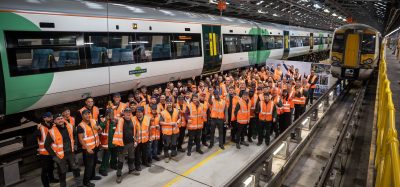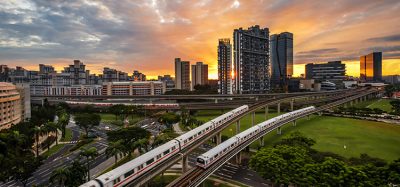Navigating the future of technology in Spanish urban mobility with Metro de Sevilla
Posted: 5 September 2024 | Jorge Maroto - Metro de Sevilla | No comments yet
Jorge Maroto, Managing Director of Metro de Sevilla, provides insight into how technological advancements are revolutionising urban transit to enhance efficiency, sustainability and the passenger experience.
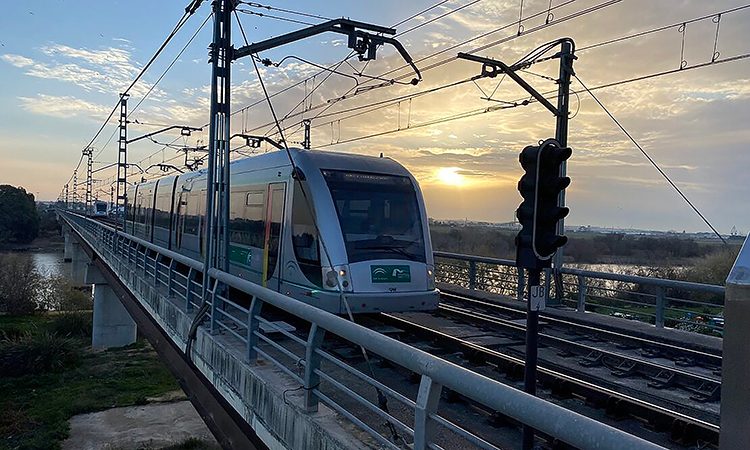

Credit: Metro de Sevilla
What impact and significance does technology have within the realm of public transportation in Sevilla?
Technology has had a profound impact on public transportation by making it more efficient, sustainable and user-friendly. At Metro de Sevilla, our operations and services have greatly benefitted from technological advancements. The integration of artificial intelligence (AI), real-time data analytics and smart ticketing systems have improved the convenience of our services, enhancing the overall passenger experience. Furthermore, technology has allowed us to optimise our operations and reduce our environmental impact, helping us to be even more sustainable and supporting our commitment to sustainability.
How is cutting-edge technology being leveraged at Metro de Sevilla to enhance the safety and efficiency of its public transportation systems?
In our case at Metro de Sevilla, cutting-edge technology has been leveraged to enhance safety and efficiency. We’ve implemented state-of-the-art surveillance and communication systems to monitor our network – including stations and trains – allowing us to respond quickly to events. Furthermore, to improve efficiency, new maintenance technologies also help us to identify and address maintenance needs before they affect or disrupt services, ensuring a reliable, safe and efficient operation.
What role does technology play in reducing the environmental impact of public transportation in Sevilla?
Technology has played a pivotal role in Metro de Sevilla’s efforts to reduce its environmental impact. Several key technological advancements have significantly contributed to this progress.
First, our transition to an open-loop ticketing system has substantially cut waste generation, as physical paper tickets are no longer necessary. This not only streamlines the passenger experience, but also reduces the production and disposal of paper tickets.
Since 2015, all of our energy comes from renewable sources, with 15% generated from our own photovoltaic panels”
Over the past decade, we’ve modernised our infrastructure, leading to a remarkable 40% decrease in energy consumption. This upgrade includes energy-efficient LED lighting, variable frequency drives and optimised catenary voltage. Additionally, our trains have been designed to efficiently capture and reuse energy during braking.
Our dedication to renewable energy is unwavering. Since 2015, all of our energy comes from renewable sources, with 15% generated from our own photovoltaic panels. Thanks to global offset programmes co-ordinated by the United Nations (UN) through Globalvia, we’ve achieved carbon neutrality.
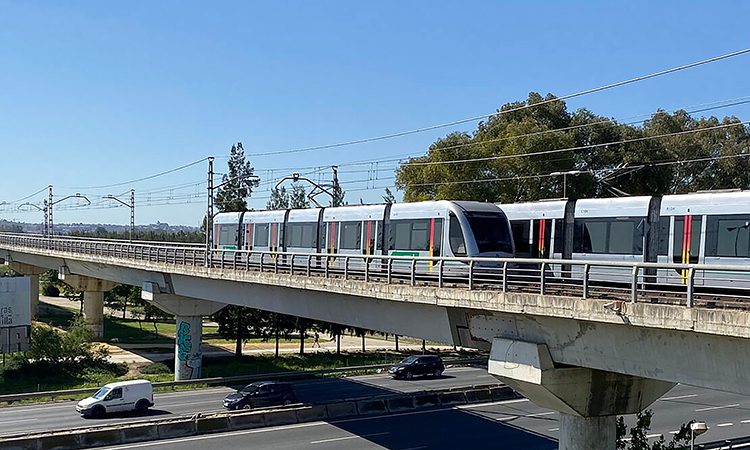

Credit: Metro de Sevilla
Notably, our electric train fleet, powered by overhead catenary systems, is an environmentally friendly choice, minimising the need for energy-intensive battery charging and reducing the overall environmental impact associated with battery manufacturing and transport.
Crucially, these technological advancements have resulted in increased ridership. By offering a top-tier service and continually introducing innovative technologies to enhance the passenger experience, we’ve successfully reduced the number of private vehicles on the road, promoting city-wide sustainability.
In addition to our core services, we’ve encouraged eco-mobility by providing parking facilities for bicycles and e-scooters at our stations, reducing emissions from short car trips and promoting sustainable transportation options.
In summary, technology has been instrumental in Metro de Sevilla’s journey to mitigate its environmental impact. From reducing waste with digital ticketing to embracing renewable energy sources, optimising energy consumption and fostering sustainable mobility, our commitment to innovation and technology has made Sevilla a greener and more sustainable city.
How has data analytics and predictive modelling contributed to the optimisation of public transportation routes and schedules for improved commuter service?
Data analytics and predictive modelling help us to analyse commuter patterns, allowing us to adjust schedules and provide better service to our passengers. By forecasting demand and adjusting our services accordingly, we have been able to reduce waiting times and avoid wasting resources.
What emerging technologies, such as autonomous vehicles or smart ticketing systems, are being explored or implemented to improve the overall passenger experience?
Our commitment to technological innovation has allowed us to eliminate the primary pain point for our riders, making their journey smoother and more convenient”
At Metro de Sevilla, we have set a pioneering standard in smart ticketing systems, fundamentally enhancing the passenger experience. Our commitment to technological innovation has allowed us to eliminate the primary pain point for our riders, making their journey smoother and more convenient.
We proudly led the way in Spain by introducing the open-loop payment system, a trailblazing advancement in subway transportation. Our system, developed by Globalvia together with the best partners, such as Inetum and others, offers passengers a seamless and hassle-free payment experience, simplifying their use of our services. As a result, physical tickets and complex fare calculations are no longer necessary. With open-loop payment, passengers can simply tap their contactless payment cards or smartphones, and they’re good to go. It’s a true game-changer, reducing the time spent in queues and making the journey more efficient.
Another ground-breaking innovation from Metro de Sevilla is our Account-Based Ticketing system. This system introduced Smart-Postpayment to public transport, allowing passengers to pay at the end of the month based on their actual usage of our services. This eliminates the need for passengers to worry about purchasing tickets or calculating fares for each trip. Instead, they can travel seamlessly and confidently, knowing that they’ll be charged accurately at the end of the billing cycle. It’s a highly customer-centric approach that simplifies the entire payment process, saving time and reducing the stress associated with traditional ticketing systems.
With these cutting-edge ticketing solutions, Metro de Sevilla has transformed the passenger experience, making it more accessible, convenient and user-friendly. Our commitment to technology and customer satisfaction is at the core of our mission, and we will continue to explore innovative ways to enhance the public transportation experience for all of our riders.
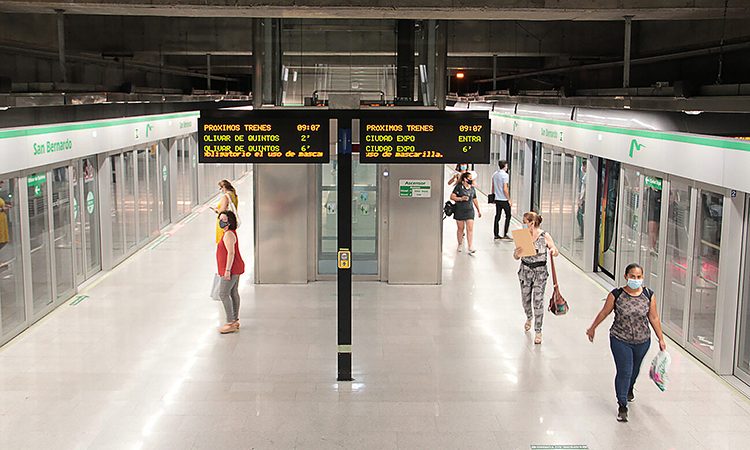

Credit: Metro de Sevilla
How does Metro de Sevilla approach the integration of different modes of public transportation – such as rail, buses, micro-mobility and ride-sharing – to create a seamless and interconnected urban mobility network?
We approach the integration of different modes of public transportation through collaboration with other transport operators including, of course, micro-mobility providers. We aim to be part of a seamless and interconnected urban mobility network by providing integrated ticketing and information platforms. This enables passengers to easily plan and pay for their journeys across various modes of transportation.
With the rise of Mobility-as-a-Service platforms, how is Metro de Sevilla working to make transportation more convenient and accessible for residents and visitors?
We are actively working to enhance transportation convenience and accessibility for residents and visitors in Sevilla through MaaS platforms, such as ‘Meep by Globalvia’. By integrating multiple modes of transportation into a single, user-friendly app, we’re empowering passengers to plan, book and pay for their journeys seamlessly and efficiently, encouraging them to use public transportation while reducing reliance on private vehicles.
What do you envision as the most promising technological advancements or innovations that will shape the future of public transportation?
The future of public transportation in Sevilla holds exciting prospects, with a focus on improved sustainability and enhanced user experience. We expect significant progress in electricity consumption, aiming to further reduce our environmental impact by implementing advanced energy-efficient technologies.
Expanding MaaS remains a top priority for us. These platforms will provide a unified travel experience, incorporating different modes of transport and enabling door-to-door services. In terms of passenger information, we strive to deliver an all-encompassing solution, empowering our passengers with tailored assistance and real-time updates at their fingertips. The integration of big data and artificial intelligence is set to transform maintenance, scheduling and overall service efficiency. These reinforce our commitment to sustainability and customer satisfaction, ensuring that Metro de Sevilla remains at the forefront of technological progress within the public transportation sector.


OUT NOW: The Definitive Guide to Rail’s Digital Future
The rail industry is undergoing a digital revolution, and you need to be ready. We have released our latest market report, “Track Insight: Digitalisation.”
This is not just another report; it’s your comprehensive guide to understanding and leveraging the profound technological shifts reshaping our industry. We move beyond the buzzwords to show you the tangible realities of AI, IoT, and advanced data analytics in rail.
Discover how to:
- Optimise operations and maintenance with real-time insights.
- Enhance passenger services through seamless, high-speed connectivity.
- Leverage technologies like LEO satellites to improve safety and efficiency.
Featuring expert analysis from leaders at Nomad Digital, Lucchini RS, Bentley Systems and more, this is a must-read for any rail professional.
Related topics
Artificial Intelligence (AI), Digitalisation, Multimodality, Passenger Experience/Satisfaction, Rail Fares/Ticket Pricing, Sustainability/Decarbonisation




